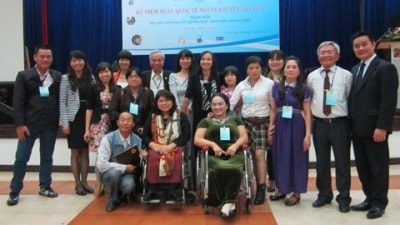Accessible tourism - towards disability inclusion
The development of tourism, the smokeless industry in Vietnam, is increasingly diversified and oriented towards the goal of "sustainable development". This development has brought great benefits to the country, at the same time creating many jobs for workers, contributing to the goal of hunger eradication and poverty reduction in Vietnam.Accessible tourism - aimed at people with disabilities (PWDs) with the goal of promoting corporate social responsibility to create job opportunities for PWDs, encouraging PWDs to work with businesses for mutual development.
 |
| Agencies, businesses, and representatives of people with disabilities participate in the Companion forum. |
With two main contents being the workshop “Recognition” and the Forum “Accompanying”, the festival “Promoting the integration of people with disabilities - developing businesses” was recently organized by the International Labor Organization (ILO), the Vietnam Chamber of Commerce and Industry (VCCI) in coordination with the People's Committee of Hoi An City, in response to the celebration of the International Day of Persons with Disabilities, December 3.
This is the ILO’s new approach to promoting the inclusion of people with disabilities. Businesses that have been and are employing people with disabilities are also speakers at the workshop to share their experiences in building infrastructure, recruiting and working with workers with disabilities. At the workshop and forum, representatives of production facilities and businesses managed by people with disabilities also shared their experiences in overcoming difficulties, their concerns in business as well as in life.
“Removing barriers for people with disabilities is very important, not only for the benefit of these individuals and their families, but also for the benefit of the community and society. The contribution of Vietnamese enterprises will therefore be essential to creating a favorable environment for people with disabilities to integrate,” said Mr. Phung Quang Huy, Director of the Vietnam Chamber of Commerce and Industry (VCCI).
At the workshop, speakers, businesses, and representatives of management agencies discussed issues related to law, awareness of disability issues, and the community's misconceptions about people with disabilities.
Director of the Center for Inclusive Development Action (IDEA), Ms. Nguyen Hong Oanh, shared about the misconceptions and misconceptions about people with disabilities that still exist in the community and are barriers that make it difficult for people with disabilities to truly integrate, and businesses are also hesitant to employ disabled workers. “In fact, all citizens are born with equal rights and employment opportunities,” Ms. Oanh emphasized. People with disabilities are the same as people without disabilities. Even if they have a part of their body that is defective, other parts still function. Therefore, they can still work, and can even do well.
ILO National Coordinator, Ms. Vu Thi Binh Minh, introduced the business network for accessible tourism for people with disabilities, ideas for improving infrastructure and services suitable for tourists with disabilities, the elderly as well as workplaces for workers with disabilities.
A large number of people with disabilities in Vietnam (more than three-quarters) live in rural areas and attend school at a much lower rate than people without disabilities. In the working environment, very few people with disabilities have stable jobs and regular income. Many of them are still not included in the regular human resources system. The unemployment rate of this group is also higher than that of people without disabilities (estimated at more than 30%).
Good experiences in investing in equipment, facilities, and services for disabled tourists from business units, and feedback from disabled tourists are also the contents of the workshop that attract the attention of participating delegates.
During the Companion Forum exchange night, people with disabilities themselves who have overcome difficulties to participate in social work and integrate into the community such as Ms. Nguyen Thi Thu (Hoi An Blind Association), Ms. Nguyen Thi Hoa (disabled and suffering from an incurable disease), Mr. Dang Ngoc Buu (handicraft production facility of the Disabled Youth Association) shared their memories when they worked in the tourism industry, the difficulties they encountered, their fears and worries that hindered their participation in integrating into the community and the tourism industry. The question that many people with disabilities ask is whether tourism businesses are willing to invest in facilities so that disabled employees can work smoothly and what are their main obstacles? Are they willing to employ workers at the facility?
According to ILO statistics, people with disabilities (PWD) currently account for about 10% of the world's population and have a great demand for tourism. It is known that in September 2013, the PROPEL (Promoting Rights and Opportunities for Persons with Disabilities: Equality Through Law) and SIT (Enhancing Tourism in the Inland Districts of Quang Nam Province) projects coordinated to organize a training workshop for tourism establishments in Hoi An on how to communicate with customers with disabilities.
A recent survey shows that very few hotels in Quang Nam invest in service infrastructure such as specialized rooms and walkways for PWDs, and their staff have not been trained in service skills and communication with PWDs. This situation exists not only in small establishments but also in large tourist areas and resorts.
Similarly, the same situation is also happening at tourist attractions in the province. Besides the fact that businesses are less interested because of the additional costs, the reason is that there are not many disabled tourists, so businesses do not invest much.
* Dr. Gyorgy Sziraczki, ILO Representative in Vietnam, shared: “I think Vietnam is very progressive in promoting the rights of people with disabilities and will continue to have significant achievements in helping people with disabilities participate in all aspects of Vietnamese society. ILO initiatives are not only for the benefit of people with disabilities themselves but also for the community and furthermore contribute to helping businesses expand and develop in terms of business and corporate culture”.
According to NDDT






